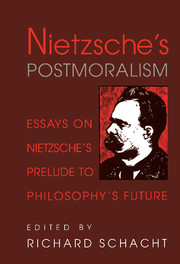Book contents
- Frontmatter
- Contents
- Contributors
- Preface
- A Note on References
- Introduction
- Nietzsche on the Illusions of Everyday Experience
- Masters without Substance
- Rethinking the Subject: Or, How One Becomes-Other Than What One Is
- The Youngest Virtue
- Morality as Psychology, Psychology as Morality: Nietzsche, Eros, and Clumsy Lovers
- On the Rejection of Morality: Bernard Williams's Debt to Nietzsche
- Nietzsche's Virtues: A Personal Inquiry
- Nietzschean Normativity
- Nietzsche's Perfectionism: A Reading of Schopenhauer as Educator
- Bibliography
Nietzsche's Perfectionism: A Reading of Schopenhauer as Educator
Published online by Cambridge University Press: 20 May 2010
- Frontmatter
- Contents
- Contributors
- Preface
- A Note on References
- Introduction
- Nietzsche on the Illusions of Everyday Experience
- Masters without Substance
- Rethinking the Subject: Or, How One Becomes-Other Than What One Is
- The Youngest Virtue
- Morality as Psychology, Psychology as Morality: Nietzsche, Eros, and Clumsy Lovers
- On the Rejection of Morality: Bernard Williams's Debt to Nietzsche
- Nietzsche's Virtues: A Personal Inquiry
- Nietzschean Normativity
- Nietzsche's Perfectionism: A Reading of Schopenhauer as Educator
- Bibliography
Summary
Nietzsche says that the worst readers are those “who proceed like plundering soldiers … picking up only those few things they can use … and blaspheming the whole” (HH II:I:137), and that the best readers are those who patiently develop an eye for the whole and know that reading must be practiced as an art – an art that “has been unlearned most thoroughly nowadays” (GM P:8).
The prevailing tendency among contemporary scholars of Nietzsche's work, when expounding his views, is to refrain from concentrating on a single work. Nietzsche's corpus is often treated as if it were one enormous, disorganized text from which one can draw individual passages at will and consider them in isolation from their original home in a given work without cost to one's understanding of his thought. Arthur Danto begins his book Nietzsche as Philosopher with a candid defense of this procedure:
Nietzsche's books give the appearance of having been assembled rather than composed. They are made up, in the main, of short, pointed aphorisms, and of essays seldom more than a few pages long.… And any given aphorism or essay might as easily have been placed in one volume as in another without much affecting the unity or structure of either. And the books themselves … do not exhibit any special structure as a corpus. No one of them presupposes an acquaintance with any other.… [H]is writings may be read in pretty much any order, without this greatly impeding the comprehension of his ideas.
- Type
- Chapter
- Information
- Nietzsche's PostmoralismEssays on Nietzsche's Prelude to Philosophy's Future, pp. 181 - 257Publisher: Cambridge University PressPrint publication year: 2000
- 21
- Cited by

